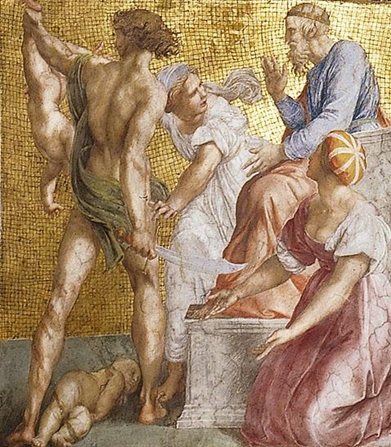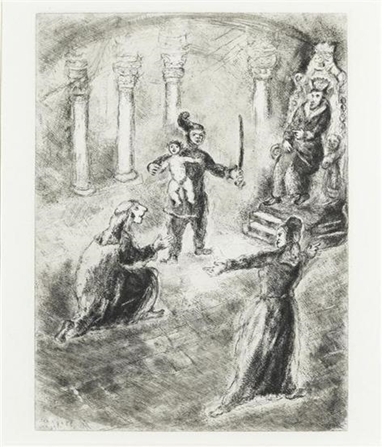Miketz
The legacy of King David and the rise of his son Solomon opens the Book of Kings. From ensuring Solomon’s place on the throne, to his developing into a powerful monarch, the Haftarot for Genesis feature these episodes prominently. Much as Genesis features transitions between generations, the Haftarot focus on the generational transition from David to Solomon. This week’s Haftarah is the second of three such Haftarot.
This week’s Haftarah is read only in years when Parashat Miketz does not fall on Chanukah. On average, this occurs once in ten years, but the spacing is sporadic: the last reading was in 2000/5761, but the next will be in 2023/5784.
I Kings 3:15-4:1
After God grants Solomon wisdom as part of a dream, he is confronted with a real-life moral and legal quandary requiring it. Two new mothers who live together without other people both claim maternity of a single infant. Each claims that the other killed her baby while asleep, exchanged the dead and live infants, and wrongfully possesses the live infant. Solomon declares that the live baby should be cut in half in order to determine the true mother - the one seeking to spare its life. This startling approach to resolving an inscrutable case demonstrated Solomon’s wisdom, solidifying his rule.
Haftarah Breakdown
Verse 3:15: Solomon awakes from a dream in which God granted him wisdom, wealth, and honor.
I Kings 3:15
Solomon awoke, and behold it was a dream. He came to Jerusalem, stood before the ark of the covenant of the Lord, offered up burnt offerings, made peace offerings, and made a feast for all his servants.
וַיִּקַ֥ץ שְׁלֹמֹ֖ה וְהִנֵּ֣ה חֲל֑וֹם וַיָּב֨וֹא יְרוּשָׁלִַ֜ם וַֽיַּעֲמֹ֣ד ׀ לִפְנֵ֣י ׀ אֲר֣וֹן בְּרִית־אֲדֹקי וַיַּ֤עַל עֹלוֹת֙ וַיַּ֣עַשׂ שְׁלָמִ֔ים וַיַּ֥עַשׂ מִשְׁתֶּ֖ה לְכָל־עֲבָדָֽיו׃
Verses 3:16-19: The first mother presents her case before him…
I Kings 3:17
One woman said, "Oh, my lord, I and this woman dwell in one house; and I gave birth to a child with her in the house.”
וַתֹּ֜אמֶר הָאִשָּׁ֤ה הָֽאַחַת֙ בִּ֣י אֲדֹנִ֔י אֲנִי֙ וְהָאִשָּׁ֣ה הַזֹּ֔את יֹשְׁבֹ֖ת בְּבַ֣יִת אֶחָ֑ד וָאֵלֵ֥ד עִמָּ֖הּ בַּבָּֽיִת׃
Verses 3:20-22: … and claims that the other woman stole her child. The second mother claims the same.
I Kings 3:20
“She [the other woman] arose in the middle of the night, took my son from beside me while your handmaid [I] slept, laid him in her bosom, and laid her dead son in my bosom.”
וַתָּקָם֩ בְּת֨וֹךְ הַלַּ֜יְלָה וַתִּקַּ֧ח אֶת־בְּנִ֣י מֵֽאֶצְלִ֗י וַאֲמָֽתְךָ֙ יְשֵׁנָ֔ה וַתַּשְׁכִּיבֵ֖הוּ בְּחֵיקָ֑הּ וְאֶת־בְּנָ֥הּ הַמֵּ֖ת הִשְׁכִּ֥יבָה בְחֵיקִֽי׃
Verses 3:23-25: Solomon decrees that the baby be chopped in two.
I Kings 3:25
The king said, "Divide the living child in two, and give half to the one, and half to the other.”
וַיֹּ֣אמֶר הַמֶּ֔לֶךְ גִּזְר֛וּ אֶת־הַיֶּ֥לֶד הַחַ֖י לִשְׁנָ֑יִם וּתְנ֤וּ אֶֽת־הַחֲצִי֙ לְאַחַ֔ת וְאֶֽת־הַחֲצִ֖י לְאֶחָֽת׃
Verses 3:26-27: … and the true mother is revealed.
I Kings 3:26
The woman whose son was the live one pleaded with the king, for she was overcome with compassion for her son. “Please, my lord,” she cried, “give her the live child; don’t kill it!” The other insisted, “it shall be neither yours nor mine. Cut it in two!”
וַתֹּ֣אמֶר הָאִשָּׁה֩ אֲשֶׁר־בְּנָ֨הּ הַחַ֜י אֶל־הַמֶּ֗לֶךְ כִּֽי־נִכְמְר֣וּ רַחֲמֶיהָ֮ עַל־בְּנָהּ֒ וַתֹּ֣אמֶר ׀ בִּ֣י אֲדֹנִ֗י תְּנוּ־לָהּ֙ אֶת־הַיָּל֣וּד הַחַ֔י וְהָמֵ֖ת אַל־תְּמִיתֻ֑הוּ וְזֹ֣את אֹמֶ֗רֶת גַּם־לִ֥י גַם־לָ֛ךְ לֹ֥א יִהְיֶ֖ה גְּזֹֽרוּ׃
Verses 3:28-4:1: Solomon’s wisdom solidifies his authority over the entire kingdom.
I Kings 3:28
All Israel heard of the judgment which the king had judged. They feared the king, for they saw that the wisdom of God (was) in him to do judgment.
וַיִּשְׁמְע֣וּ כָל־יִשְׂרָאֵ֗ל אֶת־הַמִּשְׁפָּט֙ אֲשֶׁ֣ר שָׁפַ֣ט הַמֶּ֔לֶךְ וַיִּֽרְא֖וּ מִפְּנֵ֣י הַמֶּ֑לֶךְ כִּ֣י רָא֔וּ כִּֽי־חָכְמַ֧ת אֱלֹקִים בְּקִרְבּ֖וֹ לַעֲשׂ֥וֹת מִשְׁפָּֽט׃
Parashah Connections
The Parashah and the Haftarah recount the rise to power of two wise men, Joseph and Solomon, in their respective royal households. Two methods enable each to rule: properly understanding divinely sent dreams, and using that wisdom to act boldly and creatively.
Other Connections (I)
Rabbi Yosef Caro codifies important rules of jurisprudence from this Haftarah.
Shulchan Arukh, Choshen Mishpat 17:7
The judge must hear the claims of the litigants and repeat them, for is written (1 Kings 2:23), “The king said, ‘This one says, “This (is) my son that lives, and your son (is) the dead,” and the other says,”'Not so, your son (is) the dead, and my son (is) the living”’”, and he makes the case clear in his heart [mind], and then decides it.
צריך הדיין לשמוע דברי הבעלי דינים ולשנות אותם שנאמר ויאמר המלך זאת אומרת בני החי וגו' ומצדיק הדין בלבו ואח"כ חותכו:
Other Connections (II
This Haftarah has been painted by numerous noted artists throughout the ages.
This fresco, by the Renaissance artist Raphael, is housed at the Papal Palace in Vatican City...
...and this etching, by Marc Chagall, is part of his Bible series.


